Constitutional monarchy PPT
合集下载
第7讲 英国君主立宪制的确立(课件)
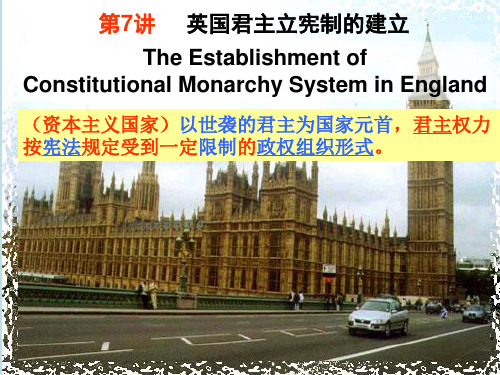
史料反映 :随着 议会改革 的开展,英国不断调整议 会选举制度;说明英国君主立宪制 趋向完善。 1832年议会改革,增强了工业资产阶级 在议会中的 地位;1918年给予妇女以选举权,说明了英国君主 立宪制制度是不断发展、完善的。
【即时训练】
1、《权利法案》载:“凡未经议会同意,以国王权威停止法 律或停止法律实施之僭越权力,为非法权力。”对上述条 文最准确的理解是 A、国王与议会商讨国家大事成为一种制度 B、法律的权威高于国王的权威 C、议会的权力超过王权,国王“统而不治” D、国王的权力受到议会的制约 2、有人形容英国议会说:“除了不能使一个女人变成男人和 使一个男人变成女人之外,能够做一切的事情”。这反映 了①议会拥有至高无上的权力 ②议会拥有立法权、财政权 和行政监督权 ③议会出现独裁专制统治 ④体现了资产阶级 对权力的需求 A、①② B、①③④ C、①②④ D、①②③④
三个转移: ①1689 立法权由 国王转移到议会 ②1721 行政权由 国王转移到内阁 ③1832政治权利由 贵族转移到工业资 产阶级,进而下移 到公民手中(1969)
【巧思妙记】“一、二、三”巧记英国君主立宪制
一条主线:议会的发展演变 (即代议制的确立、发展、完善) 两个趋势:①国王的权力逐渐削弱,以致“统而不治” ②议会权力不断增强,日益成为权力中心
【夯实基础· 重难突破】 1、“光荣革命”爆发的原因是什么?其实质和意义如何?
史料:1688年,迫于王权膨胀和天主教在英国复活的现实 危险性①,议会中的辉格党和托利党联合起来,向荷兰的执 政威廉亲王发出邀请,请他到英国来接管王位……威廉接受 邀请后率大军在英国登陆②……根据议会条件,威廉接受了 《权利法案》,随后和妻子玛丽(詹姆士二世的女儿)一同 登上了王位③。
英国的政治制度PPT课件
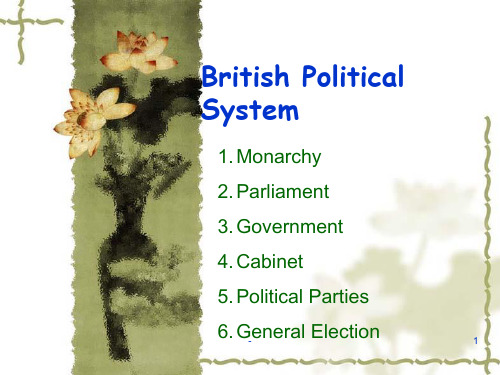
not rule.
-
3
The present Sovereign: Queen Elizabeth II since 1952
-
4
3.Prince Charles is the heir to the throne.
-
5
Prince William Arthur Philip Louis Windsor and Prince William
❖ And later they widened it to include representatives of counties, cities and towns.
❖ Representatives of communities
❖ The Commons quickly gained in political strength and in return they wanted an increasing say(发言权)in what the king was doing.
12
❖ Israel and Britain are the only two countries
without written constitutions.
❖ 英国宪法不是一个具体的法律文本,但实际上其大部分内容 还是以成文法的形式出现的,包括由议会通过的法例、法院 的判例和国际公约等等。除此之外,英国宪法的法律渊源还 包括英国议会惯例和国王特权。
The Royal Family
-
6
The Power of the Queen
1. Gives effects to all laws as the head of the executive branch of the government
-
3
The present Sovereign: Queen Elizabeth II since 1952
-
4
3.Prince Charles is the heir to the throne.
-
5
Prince William Arthur Philip Louis Windsor and Prince William
❖ And later they widened it to include representatives of counties, cities and towns.
❖ Representatives of communities
❖ The Commons quickly gained in political strength and in return they wanted an increasing say(发言权)in what the king was doing.
12
❖ Israel and Britain are the only two countries
without written constitutions.
❖ 英国宪法不是一个具体的法律文本,但实际上其大部分内容 还是以成文法的形式出现的,包括由议会通过的法例、法院 的判例和国际公约等等。除此之外,英国宪法的法律渊源还 包括英国议会惯例和国王特权。
The Royal Family
-
6
The Power of the Queen
1. Gives effects to all laws as the head of the executive branch of the government
英国君主立宪制的建立ppt51 人教课标版
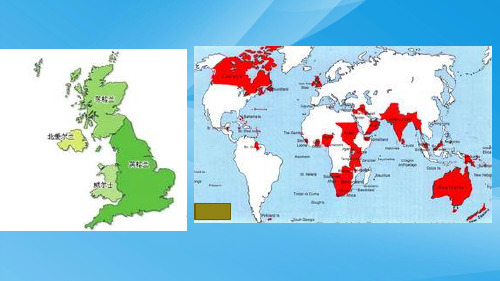
牛顿
莎士比亚
丘吉尔
人民教育出版社 历史必修Ⅰ 政治文明历程
第7课 英国君主立宪制的建立
君主立宪制
Constitutional Monarchy System
宪法约束的 君主制
君主立宪制是一种现代政体,这种制度下,国家元首 通常是世袭的,拥有某些最高权力,但是必须在宪法和法 律规定的范围内进行。
读史明智
政治斗争不一定非要你死我活,妥协是一种政治 智慧。
社会变革不一定非要推倒重来,传承中创新也是 一种政治智慧。
制度设计不可能做到至善至美,和平中渐进同样 是一种独特的政治智慧。
谢谢
1 、世上诸般美好事物中,有两者最公平,那就是青春与梦想,它不分尊卑,人人都可享有。 3 、成功就像一座平衡的秤,一边是努力,一边是快乐;付出的多,收获的也多。 3 、创造机会的人是勇者,等待机会的是愚者。 3 、太上,不知有之;其次,亲而誉之;其次,畏之;其次,侮之。信不足焉,有不信焉。 2 、天空,经常刮风经常下雨经常没太阳;季节,天渐转凉秋意渐浓记得加衣裳!生活,吃得要香睡得要甜身体要健康,祝福工作顺心,事业有成! 1 、世上诸般美好事物中,有两者最公平,那就是青春与梦想,它不分尊卑,人人都可享有。 15 、我走得很慢,但我从不后退。 6 、只要依靠自己的力量去做事情,即使条件很差,也能取得成功。 17 、磨砺内心比油饰外表要难得多,世界上没有永恒的懦弱,也没有永恒的坚强,万事靠自己,但是一定要放下懦弱,活的有尊严,活出你的坚强,才真正的体现你的自信和力量,你的活才更 有价值! 18 、金矿的山上还有着其他花朵,除了具备发现的眼睛外,还需要有着肯流汗的心。成功提示:金子常常就埋在身旁的泥土里,勤奋是最好的点金指。 2 、成功如同谷仓内的金表,早已存在于我们周围,散布于人生的每个角落,只要执著地去寻找,就一定能找到。 6 、凭借财大气粗来改变自己在公众中的丑陋形象是不明智的,一切的成功都是靠自己的努力得来的,并不是靠攀高结贵。 4 、成功离你很近,只要再多一点点坚持,你就会尝到胜利的果实。 2 、喜欢一个人,就勇敢的告诉他或者她。追求你真正爱的人,只要自己认为值得,那就是值得的。 3 、有大目标,须有大动作;有大追求,须有大改变。 9 、经过奋斗,终于拨开了云雾,见到了日出,走上了阳光大道。面对取得的成绩,不要骄傲,再接再励,继续向前行。 2 、把汗水变成珍珠,把梦想变成现实! 18 、成功就是坚韧不拔,直到成功,靠的都是强烈的成功欲望!“,by松下幸之助。---我可以说我接触过无数成功人士。凡是大成之人,都有这种坚韧不拔的好胜心和成功欲望。钱对他们来说只是 竞争过程中的一小部分,真正吸引他们的还是成功以及其带来的满足感和影响力! 1 、成功的人,都有浩然气概,他们都是大胆的勇敢的,他们的字典上,是没有“惧怕”两个字的。 2 、所谓的成功并不需要你比所有的人都强,你只需要强过自己的对手或同行,就足够能显示你的价值。 7 、生活中,虽然学习和工作很紧张,但是也应注意劳逸结合,经常磨快自己的“锯子”,以加快成功的步伐。没时间磨锯,就没有机会成功。 10 、很多事情别人通知你了,要说谢谢,没有通知你,不要责怪,因为那些事你其实应该自己弄清楚。
莎士比亚
丘吉尔
人民教育出版社 历史必修Ⅰ 政治文明历程
第7课 英国君主立宪制的建立
君主立宪制
Constitutional Monarchy System
宪法约束的 君主制
君主立宪制是一种现代政体,这种制度下,国家元首 通常是世袭的,拥有某些最高权力,但是必须在宪法和法 律规定的范围内进行。
读史明智
政治斗争不一定非要你死我活,妥协是一种政治 智慧。
社会变革不一定非要推倒重来,传承中创新也是 一种政治智慧。
制度设计不可能做到至善至美,和平中渐进同样 是一种独特的政治智慧。
谢谢
1 、世上诸般美好事物中,有两者最公平,那就是青春与梦想,它不分尊卑,人人都可享有。 3 、成功就像一座平衡的秤,一边是努力,一边是快乐;付出的多,收获的也多。 3 、创造机会的人是勇者,等待机会的是愚者。 3 、太上,不知有之;其次,亲而誉之;其次,畏之;其次,侮之。信不足焉,有不信焉。 2 、天空,经常刮风经常下雨经常没太阳;季节,天渐转凉秋意渐浓记得加衣裳!生活,吃得要香睡得要甜身体要健康,祝福工作顺心,事业有成! 1 、世上诸般美好事物中,有两者最公平,那就是青春与梦想,它不分尊卑,人人都可享有。 15 、我走得很慢,但我从不后退。 6 、只要依靠自己的力量去做事情,即使条件很差,也能取得成功。 17 、磨砺内心比油饰外表要难得多,世界上没有永恒的懦弱,也没有永恒的坚强,万事靠自己,但是一定要放下懦弱,活的有尊严,活出你的坚强,才真正的体现你的自信和力量,你的活才更 有价值! 18 、金矿的山上还有着其他花朵,除了具备发现的眼睛外,还需要有着肯流汗的心。成功提示:金子常常就埋在身旁的泥土里,勤奋是最好的点金指。 2 、成功如同谷仓内的金表,早已存在于我们周围,散布于人生的每个角落,只要执著地去寻找,就一定能找到。 6 、凭借财大气粗来改变自己在公众中的丑陋形象是不明智的,一切的成功都是靠自己的努力得来的,并不是靠攀高结贵。 4 、成功离你很近,只要再多一点点坚持,你就会尝到胜利的果实。 2 、喜欢一个人,就勇敢的告诉他或者她。追求你真正爱的人,只要自己认为值得,那就是值得的。 3 、有大目标,须有大动作;有大追求,须有大改变。 9 、经过奋斗,终于拨开了云雾,见到了日出,走上了阳光大道。面对取得的成绩,不要骄傲,再接再励,继续向前行。 2 、把汗水变成珍珠,把梦想变成现实! 18 、成功就是坚韧不拔,直到成功,靠的都是强烈的成功欲望!“,by松下幸之助。---我可以说我接触过无数成功人士。凡是大成之人,都有这种坚韧不拔的好胜心和成功欲望。钱对他们来说只是 竞争过程中的一小部分,真正吸引他们的还是成功以及其带来的满足感和影响力! 1 、成功的人,都有浩然气概,他们都是大胆的勇敢的,他们的字典上,是没有“惧怕”两个字的。 2 、所谓的成功并不需要你比所有的人都强,你只需要强过自己的对手或同行,就足够能显示你的价值。 7 、生活中,虽然学习和工作很紧张,但是也应注意劳逸结合,经常磨快自己的“锯子”,以加快成功的步伐。没时间磨锯,就没有机会成功。 10 、很多事情别人通知你了,要说谢谢,没有通知你,不要责怪,因为那些事你其实应该自己弄清楚。
Constitutional Monarchy君主立宪制
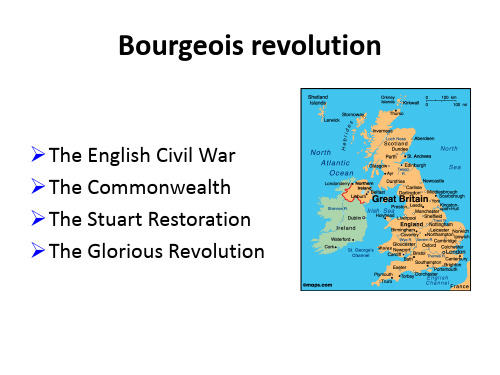
Constitutional Monarchy in England • The history background
• The glorious revolution of 1688, overthrew the autocratic rule of the feudal restoration dynasty. • The proclamation of the English Bill of Rights.
Mary married to Dutch Protestant William of Orange Anne married to Protestant Prince of Denmark
The Glorious Revolution of 1688
After the birth of a Catholic son (who would inherit the throne), James II fled England for France Parliament invited his daughter Mary and her husband William to rule England as joint sovereigns Laws were passed to ensure a Protestant succession
The English Bill of Rights
• Time : in 1689 • Purpose : limit the power of the king ensure the rights of the people. • Influence : provide legal guarantee for the limitation of kingship; the establishment of parliamentary monarchy powerful than the kingship, and gradually established a constitutional monarchy of the bourgeois revolution
君主立宪制讲解英文ppt
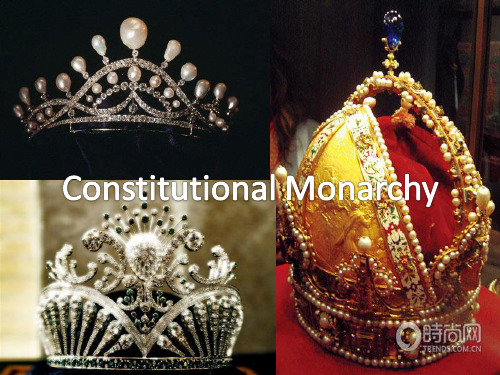
Prime Minister of the United Kingdom David Cameron
The Monarchy
Britain is a constitutional monarchy: Queen Elizabeth II is the head of state. In practice she reigns, but does not rule. The country is governed, in her name, by the Government, a body of ministers, which is called the Cabinet (consists of 22 leading ministers), who are responsible to Parliament.
the Parliament House of Britain
three major political parties in the British system of politics:
The Labour Party (often called New Labour) The Conservative Party (frequently called the Tories) The Liberal Democrat Party (known as the Lib Dems)
•Diet has powers over the budget, and can unseat a PM and cabinet through a vote of no confidence. It holds Q-time for Pmor or Cabinet, and has a range of specialist committees.
The Monarchy
Britain is a constitutional monarchy: Queen Elizabeth II is the head of state. In practice she reigns, but does not rule. The country is governed, in her name, by the Government, a body of ministers, which is called the Cabinet (consists of 22 leading ministers), who are responsible to Parliament.
the Parliament House of Britain
three major political parties in the British system of politics:
The Labour Party (often called New Labour) The Conservative Party (frequently called the Tories) The Liberal Democrat Party (known as the Lib Dems)
•Diet has powers over the budget, and can unseat a PM and cabinet through a vote of no confidence. It holds Q-time for Pmor or Cabinet, and has a range of specialist committees.
第5讲 英国资产阶级革命

都需要专政;而且需要强有力的专 政”。——马克思
平等派的抗争及被压制
1649年2月,利尔本发表《揭露英国的新枷锁》,对独立派 新建立的行政机关国务会议进行了抨击,认为国务会议有可 能消灭国会并演变成专制的机构。 1649年3月他又发表《揭露英国的新枷锁》第2部,要求国会 保障人民的权利免受军官们的侵犯,矛头已指向独立派。此 外,还指责国会没有改善人民生活状况,要求尽快实现《人 民公约》。 群众于3月底和4月初两次将数万人签名的请愿书送交国会, 要求释放被捕者。 5月上旬,平等派士兵发动了起义。秋季,再一次发动起义。
查理一世与议会矛盾的激化
Charles
I ,詹姆斯一世之子,1612年其兄威 尔士亲王亨利去世后成为王储。1625年,即 位为不列颠国王,称查理一世,并与法国国 王路易十三的妹妹亨莉雅妲•玛利亚公主结婚。 生子女八人,包括后来任国王的查理二世 (1660-1683)、詹姆斯二世(1683-1688)。
3. 长老派、独立派 和平等派(Levellers)之间的斗争
两次内战之间(1646—1648 年)英国国内 的政治斗争主要是在三个政治派别之间展 开的。它们是代表大资产阶级和上层新贵 族利益的长老派;代表中等贵族和资产阶 级利益的独立派;代表社会中下层人民利 益的平等派。
平等派
平等派是小资产阶级民主派,形成于第一次内战结 束之时,是由于对长老会派的排他性政策不满而组 织起来的,主要活动在军队之中。 平等派奉行主权在民学说,要求建立实行普选权的 一院制民主共和国。在共和制度下,公民享有言论、 出版、集会和信仰的自由。在社会经济方面,彻底 废除专卖特许制度和垄断贸易公司,取消教会什一 税,减轻税收,救济贫民,保障人身和私有财产的 不可侵犯,将地主已圈占的公有土地归还给农民。
第7课 英国君主立宪制的建立
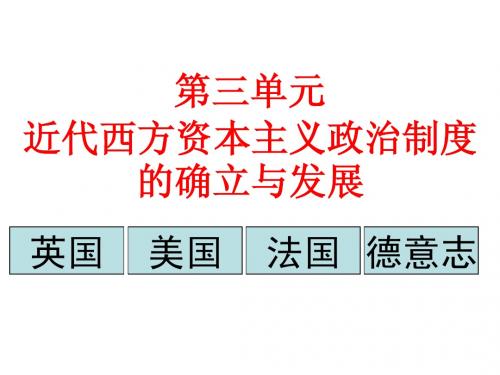
英国首相布莱尔27日在最后一次前往议会 英国首相布莱尔 日在最后一次前往议会 接 受议员提问之后 向英国女王 之后, 女王伊丽莎白二世正式递 受议员提问之后,向英国女王伊丽莎白二世正式递 交辞呈,从而宣告结束自己长达10年的首相生涯 年的首相生涯。 交辞呈,从而宣告结束自己长达 年的首相生涯。 英国执政党工党新任领袖布朗27 执政党工党新任领袖布朗27日下午应英 英国执政党工党新任领袖布朗27日下午应英 女王伊丽莎白二世的邀请前往白金汉宫 伊丽莎白二世的邀请前往白金汉宫, 国女王伊丽莎白二世的邀请前往白金汉宫,接受女 王授权组建新一届内阁,并从女王手中接受御玺, 王授权组建新一届内阁,并从女王手中接受御玺, 内阁 正式就任英国首相。 正式就任英国首相。
第三单元 近代西方资本主义政治制度 的确立与发展 英国 美国 法国 德意志
英国国家大权掌握在谁手中? 英国国家大权掌握在谁手中?
无实权 国家元首 最高 决策者
第 7 课 英国君主立宪制的建立
Constitutional Monarchy System in England 宪法的 君主制
概念 君主立宪制:是指资本主义国 是指资本主义国
议会权力
责任制内阁的形成( 责任制内阁的形成(Cabinet) ——英国君主立宪制下的国家政权组织形式 英国君主立宪制下的国家政权组织形式 英国君主立宪制下的
内阁的起源: ⑴内阁的起源: 内阁的形成: ⑵内阁的形成:
英国第一任 首相
沃尔波尔 布朗
⑶内阁的运作: 内阁的运作: 运作
英国现任 首相
三、完善:责任内阁制的形成 完善:
背景----资产阶级革命和光荣革命 ----资产阶级革命和 一、背景----资产阶级革命和光荣革命 议会 1、根本原因 资本主义经济迅速发展 资产阶级和新贵族形成 斯图亚特王朝的专制统治
7课英国君主立宪制
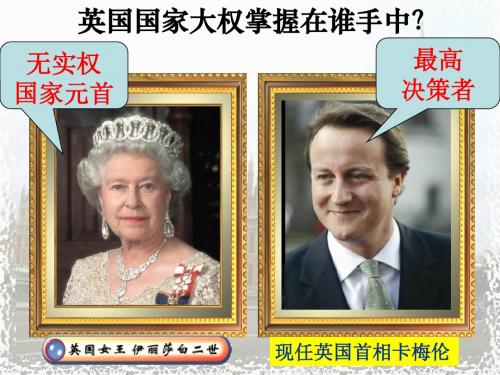
活学活用
每日经济新闻报道:金融危机愈演愈烈,英伦三岛早 已是深陷泥潭。英国财政大臣达林10月8日上午宣布了一 揽子银行救助计划,英国政府将向英国各大商业银行注入 高达500亿英镑 (880亿美元)的资金。甚至准备将中小 银行国有化。你认为: ◆ 内阁成员大体上是赞成还是反对?为什么? 赞同。集体负责,共同进退。 ◆ 女王伊丽莎白二世如果反对,布朗首相会不会为此 改变策略,为什么? 不会。首相掌握行政大权,不对国王负责。 ◆ 如果议会中大多数都极力反对,结果又会如何? 议会可以通过对政府的不信任案,要求内阁下台; 内阁要么下台,要么宣布解散议会,重新选举。
光 荣 革 命 1688年 完 成
革命爆发 1640年
1660年 斯图亚特王朝 复辟 时间
• 1、“它是一场没有流血的戏剧,不具有革命性 质,麦考来的《英国史》称它是”理想的、合法 的、典范的革命“。这场革命的实质是( ) • A 封建政权内部的争夺政权的斗争 • B 资产阶级与封建势力妥协的斗争 • C 资产阶级内部的争夺政权的斗争 • D 封建国王与克伦威尔争夺政权的斗争
英国国家大权掌握在谁手中?
无实权 国家元首 最高 决策者
现任英国首相卡梅伦 前英国首相布朗
第 7 课 英国君主立宪制的建立
Constitutional Monarchy System in England 宪法的
君主立宪制含义:
君主制
国家的一切是由法律来决定的,君主无实权, 而且本身也要遵循法律。
小结
一条主线:英国君主立宪制的确立、发展、完善 过程 两大趋势: 国王权力不断削弱 议会权力不断增强 三个转移:立法权、财政权等从国王转移到议会 (《权利法案》) 行政权从国王手里转移到内阁 (责任内阁制确立) 民主权利转移:议会改革 (贵族民主→工业资产阶级民主→公民民主)
- 1、下载文档前请自行甄别文档内容的完整性,平台不提供额外的编辑、内容补充、找答案等附加服务。
- 2、"仅部分预览"的文档,不可在线预览部分如存在完整性等问题,可反馈申请退款(可完整预览的文档不适用该条件!)。
- 3、如文档侵犯您的权益,请联系客服反馈,我们会尽快为您处理(人工客服工作时间:9:00-18:30)。
Think about the relevance of the monarchy in the 21st Century
Constitutional Monarchy
Constitutional monarchy is a form of government in which a king or queen acts as Head of State.
- A constitutional monarchy also provides stability, continuity and a national focus, as the Head of State remains the same even as governments change.
U.K. Parliament
Parliament is divided into two main Houses – the upper house (the House of Lords), and the lower house (the House of Commons). The Sovereign is the head of Parliament.
Parliament is based in Westminster Palace.
The Upper House – The House of Lords
The Right Honourable The Lords Spiritual and Temporal in Parliament Assembled
783 Seats (positions) Who? Lords Temporal: Peers of the realm: life peers and hereditary peers (Sir, Lord, Baron, Duke etc) Lords Spiritual: senior members of the Church of England What? - Much less power than the House of Commons - Discuss, debate and vote on new laws - if they vote against a new law, they can only stop it from being passed for 2 years House of Lords Act 1999 - Before this, all hereditary peers were automatically allowed to sit in Parliament - Now, life peers automatically allowed to sit - 92 hereditary peers were elected (by life peers) and can also sit in Parliament
Her full title, by virtue of the Royal Titles Act of 1953, is: "Elizabeth the Second, by the Grace of God of the United Kingdom of Great Britain and Northern Ireland and of Her other Realms and Territories Queen, Head of the Commonwealth, Defender of the Faith"
- A constitutional monarchy also provides stability, continuity and a national focus, as the Head of State remains the same even as governments change.
- It is the elected government, not the Monarch, who has the ability to make and pass laws. - As a system of government, constitutional monarchy separates the Head of State’s ceremonial and official duties from party politics.
- As a constitutional monarch, the Sovereign must remain politically neutral.
- On almost all matters the Sovereign acts on the advice of ministers. However, the Sovereign retains an important political role as Head of State, formally appointing prime ministers, formally approving legislation and bestowing honours.
The leader of the ruling party is the Prime Minister. He/she is chosen by their party, and cannot make decisions without support of the House of Commons.
- The Sovereign/Monarch governs according to the constitution - that is, according to rules, rather than according to his or her own free will. There isn't a single constitution in the U.K, but a series of laws which must be followed.
U.K. Coalition Government
The last General Election (in 2010) resulted in a hung parliament. This means that none of the parties received an absolute majority (over 50% 326 seats). The Conservative Party won the highest number of seats (306). The Conservatives made an agreement with the Liberal Democrats to form a coalition government, so together they could achieve an absolute majority. The Labour Party won the next highest number of seats – 258 – so they became the Opposition.
- It is the elected government, not the Monarch, who has the ability to make and pass laws. - As a system of government, constitutional monarchy separates the Head of State’s ceremonial and official duties from party politics.
- The Sovereign/Monarch governs according to the constitution - that is, according to rules, rather than according to his or her own free will. There isn't a single constitution in the U.K, but a series of laws which must be followed.
Constitutional Monarchy
Constitutional monarchy is a form of government in which a king or queen acts as Head of State.
- It is the elected government, not the Monarch, who has the ability to make and pass laws. - As a system of government, constitutional monarchy separates the Head of State’s ceremonial and official duties from party politics.
The Lower House – the House of Commons
The Honourable The Commons in Parliament Assembled
650 Seats (positions) Who? The Government A minister is chosen from each constituency by the electorate, and sit in the House of Commons (they are called MPs – Members of Parliament) MPs belong to a political party (there are several parties, each with their own opinions and aims). A General Election takes place every 5 years to decide which political party will lead the Government. Usually, the party with the highest number of votes leads the government, with the next highest party in the opposition. The ruling party and the opposition sit together to discuss and make laws.
Constitutional Monarchy
Constitutional monarchy is a form of government in which a king or queen acts as Head of State.
- A constitutional monarchy also provides stability, continuity and a national focus, as the Head of State remains the same even as governments change.
U.K. Parliament
Parliament is divided into two main Houses – the upper house (the House of Lords), and the lower house (the House of Commons). The Sovereign is the head of Parliament.
Parliament is based in Westminster Palace.
The Upper House – The House of Lords
The Right Honourable The Lords Spiritual and Temporal in Parliament Assembled
783 Seats (positions) Who? Lords Temporal: Peers of the realm: life peers and hereditary peers (Sir, Lord, Baron, Duke etc) Lords Spiritual: senior members of the Church of England What? - Much less power than the House of Commons - Discuss, debate and vote on new laws - if they vote against a new law, they can only stop it from being passed for 2 years House of Lords Act 1999 - Before this, all hereditary peers were automatically allowed to sit in Parliament - Now, life peers automatically allowed to sit - 92 hereditary peers were elected (by life peers) and can also sit in Parliament
Her full title, by virtue of the Royal Titles Act of 1953, is: "Elizabeth the Second, by the Grace of God of the United Kingdom of Great Britain and Northern Ireland and of Her other Realms and Territories Queen, Head of the Commonwealth, Defender of the Faith"
- A constitutional monarchy also provides stability, continuity and a national focus, as the Head of State remains the same even as governments change.
- It is the elected government, not the Monarch, who has the ability to make and pass laws. - As a system of government, constitutional monarchy separates the Head of State’s ceremonial and official duties from party politics.
- As a constitutional monarch, the Sovereign must remain politically neutral.
- On almost all matters the Sovereign acts on the advice of ministers. However, the Sovereign retains an important political role as Head of State, formally appointing prime ministers, formally approving legislation and bestowing honours.
The leader of the ruling party is the Prime Minister. He/she is chosen by their party, and cannot make decisions without support of the House of Commons.
- The Sovereign/Monarch governs according to the constitution - that is, according to rules, rather than according to his or her own free will. There isn't a single constitution in the U.K, but a series of laws which must be followed.
U.K. Coalition Government
The last General Election (in 2010) resulted in a hung parliament. This means that none of the parties received an absolute majority (over 50% 326 seats). The Conservative Party won the highest number of seats (306). The Conservatives made an agreement with the Liberal Democrats to form a coalition government, so together they could achieve an absolute majority. The Labour Party won the next highest number of seats – 258 – so they became the Opposition.
- It is the elected government, not the Monarch, who has the ability to make and pass laws. - As a system of government, constitutional monarchy separates the Head of State’s ceremonial and official duties from party politics.
- The Sovereign/Monarch governs according to the constitution - that is, according to rules, rather than according to his or her own free will. There isn't a single constitution in the U.K, but a series of laws which must be followed.
Constitutional Monarchy
Constitutional monarchy is a form of government in which a king or queen acts as Head of State.
- It is the elected government, not the Monarch, who has the ability to make and pass laws. - As a system of government, constitutional monarchy separates the Head of State’s ceremonial and official duties from party politics.
The Lower House – the House of Commons
The Honourable The Commons in Parliament Assembled
650 Seats (positions) Who? The Government A minister is chosen from each constituency by the electorate, and sit in the House of Commons (they are called MPs – Members of Parliament) MPs belong to a political party (there are several parties, each with their own opinions and aims). A General Election takes place every 5 years to decide which political party will lead the Government. Usually, the party with the highest number of votes leads the government, with the next highest party in the opposition. The ruling party and the opposition sit together to discuss and make laws.
